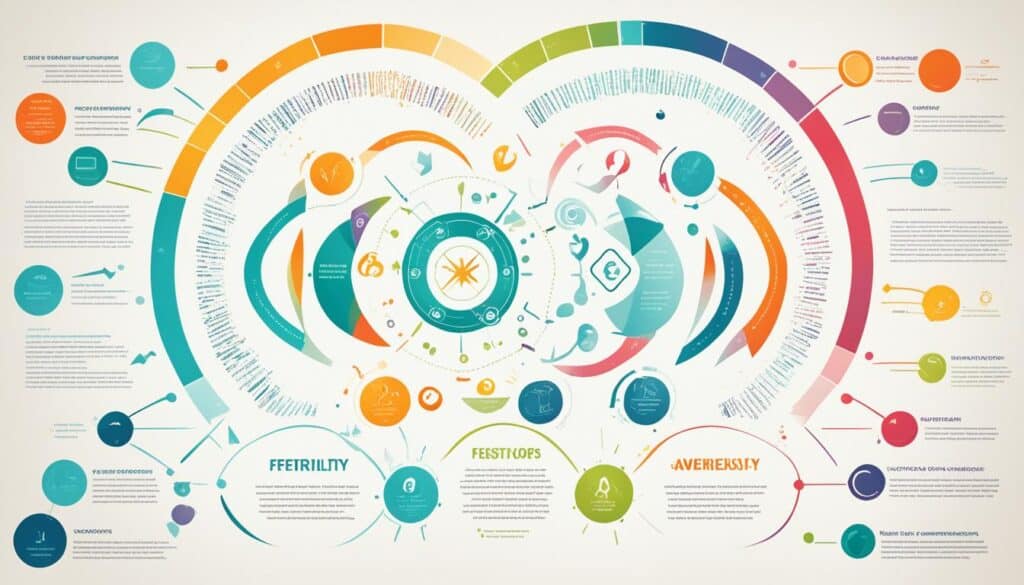
Imagine this: You and your partner have decided it’s finally time to start a family. Excitement fills the air as you envision the joy of parenthood and all the new adventures that lie ahead. But as months pass without conception, doubt and frustration start to creep in. You begin to wonder if there’s something wrong, if there’s something you’re missing.
Enter the world of fertility awareness. A natural path to understanding your reproductive health and planning, the fertility awareness method empowers you to take control of your fertility journey. By learning to interpret the signals and signs of your menstrual cycle, you can gain a better understanding of your body and use this knowledge for various purposes, whether it’s natural birth control, conception, or simply gaining insight into your hormonal health.
Unlike other contraceptive methods that rely on hormones or devices, fertility awareness puts you in tune with your body’s natural rhythms. It’s a holistic approach that respects your body’s innate wisdom and helps you work with it rather than against it. By mastering the fertility awareness method, you can embark on a journey of self-discovery, paving the way for a deeper connection with your reproductive health.
But where do you begin? How do you navigate this vast sea of information and find the approach that works best for you? Don’t worry, we’ve got you covered. In this comprehensive guide, we’ll explore the different fertility awareness methods, their effectiveness rates, and the importance of education and technology in this empowering journey.
So, buckle up and get ready to embark on a journey of self-discovery, as we delve into the world of fertility awareness and unlock the secrets to mastering your reproductive health.
Understanding the Different Fertility Awareness Methods
There are several different fertility awareness methods available, each with its own approach and effectiveness rates. By understanding these methods, you can make informed decisions about which one may be most suitable for your needs.
Standard Days Method
The Standard Days Method involves avoiding unprotected sex from day 8 to day 19 of the menstrual cycle. This method relies on the understanding that most women have a menstrual cycle of 26 to 32 days and ovulate between days 12 and 16. By abstaining from intercourse during this period, the risk of pregnancy is decreased. When used correctly, the Standard Days Method has a lower pregnancy rate compared to other fertility awareness methods.
Cervical Mucus or Ovulation Method
The Cervical Mucus or Ovulation Method requires evaluating cervical secretions several times daily to determine fertile days. As the menstrual cycle progresses, the consistency and appearance of cervical mucus change, indicating the fertility status. By monitoring these changes, individuals can identify when they are potentially fertile and avoid unprotected sex during this time. When used properly, the Cervical Mucus Method has a lower pregnancy rate.
TwoDay Method
The TwoDay Method focuses on observing cervical secretions to determine fertility. This method involves checking for cervical mucus daily and noting any presence of secretions. If there are secretions present on any given day, it is considered a potentially fertile day. By abstaining from intercourse on all days with cervical secretions, the risk of pregnancy is reduced. The TwoDay Method has a low pregnancy rate when used consistently and correctly.
Symptothermal Method
The Symptothermal Method combines changes in cervical secretions with basal body temperature measurements to identify fertile days. Basal body temperature is the body’s lowest temperature at rest, which increases after ovulation. By tracking changes in both cervical secretions and basal body temperature, individuals can determine their fertility status accurately. When used correctly, the Symptothermal Method has a low pregnancy rate.
Thorough counseling and education are crucial to ensure the correct use of these fertility awareness methods and to maximize their effectiveness. Fertility apps can also be used as useful tools alongside these methods, but they should not be solely relied upon without proper knowledge and training in fertility awareness.
| Method | Approach | Effectiveness Rate |
|---|---|---|
| Standard Days Method | Avoiding unprotected sex from day 8 to day 19 of the menstrual cycle | Lower pregnancy rate with correct use |
| Cervical Mucus or Ovulation Method | Evaluating cervical secretions to determine fertile days | Lower pregnancy rate with proper use |
| TwoDay Method | Avoiding unprotected sex on all days with cervical secretions | Low pregnancy rate |
| Symptothermal Method | Combining changes in cervical secretions and basal body temperature | Low pregnancy rate |
The Importance of Education and Technology in Fertility Awareness
One common misconception about fertility awareness is that it is a method that requires little effort and can be easily dismissed. However, education plays a crucial role in successfully using fertility awareness methods. It is essential for individuals to understand their bodies and learn how to interpret the signs and signals of their menstrual cycles. Proper education empowers individuals to make informed decisions regarding their reproductive health and contraceptive choices.
In addition to education, technology can provide helpful tools in tracking and monitoring fertility. Fertility apps, when used in conjunction with proper knowledge, can assist individuals in tracking their cycles and predicting fertile windows. However, it is important to note that not all fertility apps are accurate and reliable, and it is recommended to choose apps that are evidence-based and backed by research.
One example of a fertility device that combines technology and education is the Daysy Fertility Monitor. Daysy uses data from millions of cycles to predict ovulation and provides color-coded signals to indicate fertility status. It is important to remember that technology should complement, not replace, proper education in fertility awareness.
No Comments yet!